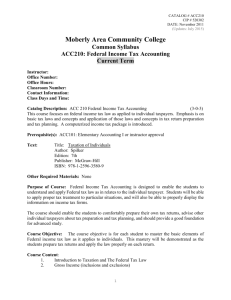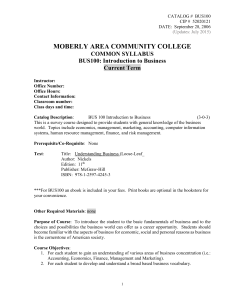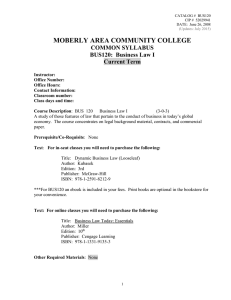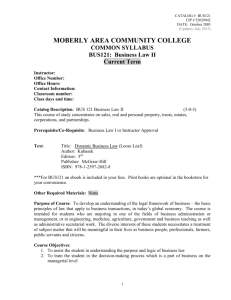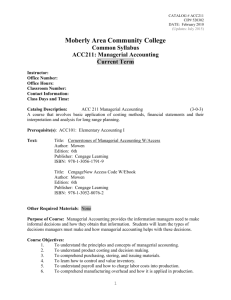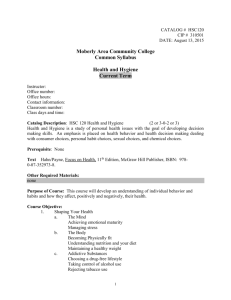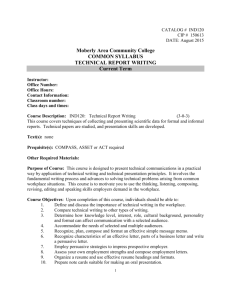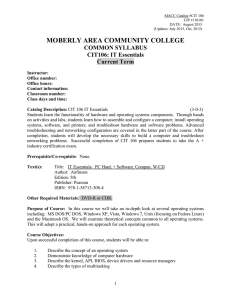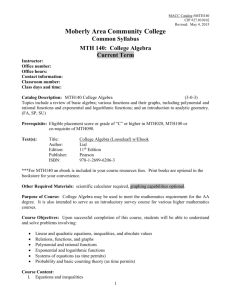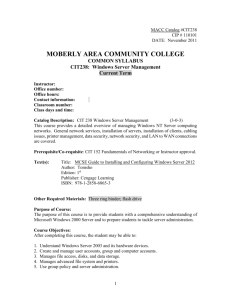MTH 130 Technical Mathematics - Moberly Area Community College
advertisement
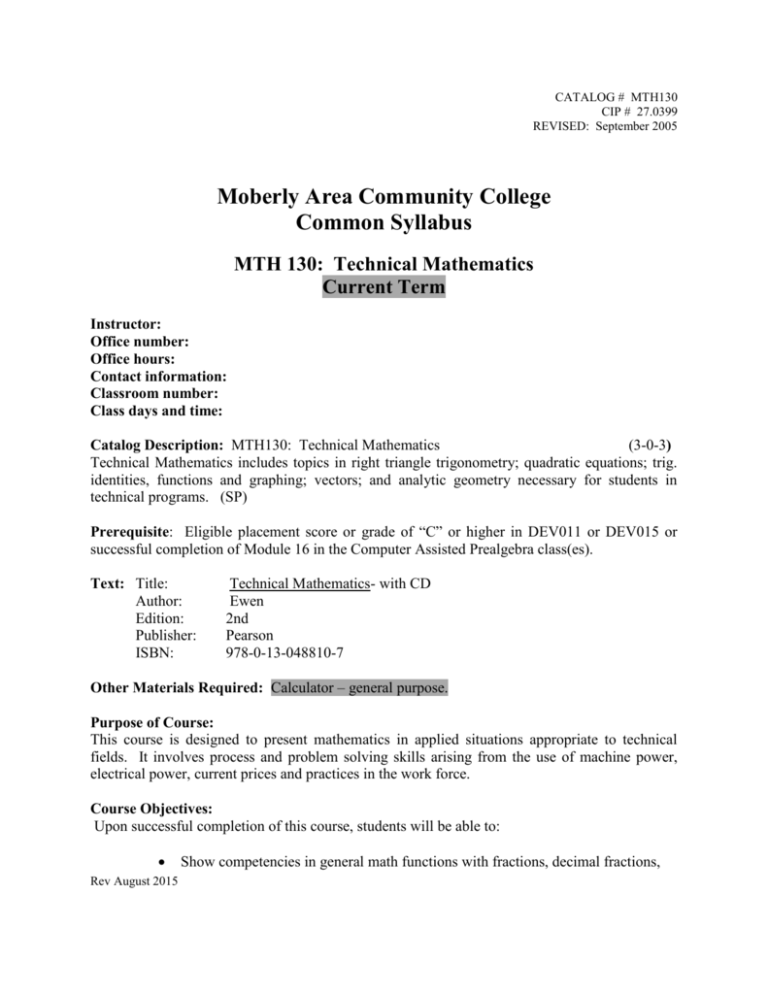
CATALOG # MTH130 CIP # 27.0399 REVISED: September 2005 Moberly Area Community College Common Syllabus MTH 130: Technical Mathematics Current Term Instructor: Office number: Office hours: Contact information: Classroom number: Class days and time: Catalog Description: MTH130: Technical Mathematics (3-0-3) Technical Mathematics includes topics in right triangle trigonometry; quadratic equations; trig. identities, functions and graphing; vectors; and analytic geometry necessary for students in technical programs. (SP) Prerequisite: Eligible placement score or grade of “C” or higher in DEV011 or DEV015 or successful completion of Module 16 in the Computer Assisted Prealgebra class(es). Text: Title: Author: Edition: Publisher: ISBN: Technical Mathematics- with CD Ewen 2nd Pearson 978-0-13-048810-7 Other Materials Required: Calculator – general purpose. Purpose of Course: This course is designed to present mathematics in applied situations appropriate to technical fields. It involves process and problem solving skills arising from the use of machine power, electrical power, current prices and practices in the work force. Course Objectives: Upon successful completion of this course, students will be able to: Rev August 2015 Show competencies in general math functions with fractions, decimal fractions, CATALOG # MTH130 CIP # 27.0399 REVISED: September 2005 percentages and solve word problems Apply basic math functions to personal finances and lines and graphs as well as calculate and read units of measurements, perimeter, area, and volume Show competencies in the fundamentals of algebra and solve problems using signed numbers and algebra Show competencies in applied math including plane trigonometry, scientific notation, and engineering notation Understand a number line, addition, subtraction, multiplication and division of signed numbers Course Content: Fundamentals of General Mathematics: whole numbers, common fractions, decimal fractions, percentage, graphs: Bar and line. Measurement: precision, accuracy, tolerance, measurement units, steel rules and vernier calipers, micrometers. Fundamentals of Algebra: introduction to algebra, signed numbers, basic algebra operations, simple equations, complex equations, ratio and proportion, rectangular coordinate system, graphs of linear equations, systems of equations. Fundamentals of Plane Geometry: introduction to plane geometry, angular measure. Commuted Measurements: areas of common polygons, areas of circles, sectors, segments, ellipses, volumes, surface areas, weights, prisms, cylinders, pyramids, cones, spheres, composite figures. Assessment of Student Learning: Grading: Grades will be based on the following scale: A = 90 - 100% Homework B = 80 - 89% Unit Tests C = 70 - 79% Midterm Exam D = 60 - 69% Final Exam F = 59% and below 35% 35% 15% 15% Description of Major Assignments: Course work will be based on lecture and discussion. Work assignments will be made with each unit and discussed in class. Students will be expected to discuss completed homework during class sessions. Early course work will be completed without the use of calculators. Periodic spot quizzes will be given. Statement to Connect Course with General Education Outcomes or Technical Program Outcome Statement: Rev August 2015 CATALOG # MTH130 CIP # 27.0399 REVISED: September 2005 II. Demonstrate an understanding of scientific principles and computational skills and how to use them to solve problems and make informed decisions. Instructor Policies: Academic Dishonesty: MACC board policy is as follows: “Academic dishonesty by students damages institutional credibility and unfairly jeopardizes honest students; therefore, it will not be tolerated in any form.” Forms of academic dishonesty include but are not limited to the following: violations of copyright law, plagiarism, fabrication, cheating, collusion, and other academic misconduct. Incidents of dishonesty regarding assignments, examinations, classroom/laboratory activities, and/or the submission of misleading or false information to the College will be treated seriously. The procedure for handling academic dishonesty is outlined in the Student Handbook (Policy Handbook M.010). In cases of alleged academic dishonesty, the burden of proof is on the student, not on the instructor. Attendance: Any student who misses two consecutive weeks of class during a regular sixteen-week semester or the equivalent proportion of class time during a shorter session will be dropped from the class by the instructor unless acceptable justification is supplied. Additionally, any student who misses more than one-fourth of the entire number of in-seat class meetings in a regular 16-week semester or the equivalent proportion of class time during a shorter session, may be dropped from that class by the instructor if, in the opinion of the instructor, the student does not have reasonable opportunity to succeed in the class. A student’s attendance rate will be calculated based upon the first day of the semester (not the student’s date of enrollment in the course). Student attendance must be defined in a different manner for online, hybrid, and virtual courses. Student attendance in these courses is defined as active participation in the course. Online, hybrid, and virtual courses will, at a minimum, have weekly mechanisms for student participation, such as any or all of the following methods: a. Completion of quizzes or exams b. Submission of assignments c. Participation in threaded discussions d. Communication with the instructor A student who does not participate in an online, hybrid, or virtual course for two consecutive weeks will be dropped by the instructor unless acceptable justification is supplied. As with ground courses, a student’s attendance rate in online courses will also be calculated based upon the first day of the semester. If a student does not demonstrate active participation in the online course within the first two weeks (or the equivalent proportion of class time Rev August 2015 CATALOG # MTH130 CIP # 27.0399 REVISED: September 2005 during a short session), the student will be dropped as “never attended.” Simply logging into an online class does not constitute active participation. Students should be aware that their dropping a course and their last date of attendance in the course may impact their financial aid. Tardiness: per instructor’s policy Make-up and late work: per instructor’s policy Extra-credit work: per instructor’s policy Schedule of Student Asignment/Activities: per instructor’s policy ADA Statement Students who have disabilities that qualify under the Americans with Disabilities Act may register for assistance through the Office of Access and ADA Services. Students are invited to contact the Access Office to confidentially discuss disability information, academic accommodations, appropriate documentation and procedures. For more information, please call either the Moberly office at (660) 263-4100 x 11240 or the Columbia office at (573) 234-1067 x 12120, or visit our web page at http://www.macc.edu/index.php/services/access-office. Title IX Statement MACC maintains a strict policy prohibiting sexual misconduct in any form, including sexual harassment, sexual discrimination, and sexual violence. All MACC employees, including faculty members, are considered mandated reporters of sexual misconduct and as such are expected to contact the Title IX Coordinator when they become aware, in conversation or in writing, of an incident of sexual misconduct. For more information on this policy or to learn about support resources, please see http://www.macc.edu/sexual-misconduct-policy or contact Dr. Jackie Fischer, MACC’s Title IX Coordinator, at 660-263-4110, ext. 11236 or jackief@macc.edu. Rev August 2015
